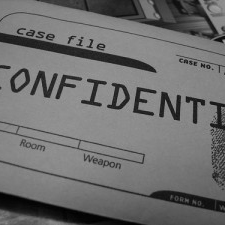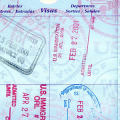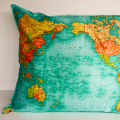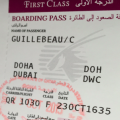How to File a Freedom of Information Act Request for Your Travel History

Early this morning I sent out an envelope containing an official Freedom of Information Act Request to the U.S. government.
Am I a conspiracy theorist? Have I started stockpiling canned food and building a bomb shelter behind my apartment?
Sorry to disappoint anyone holed up in a cabin somewhere, but not really. I refuse to visit any bomb shelter that doesn’t provide wifi and a french press. In this case, I’m mostly just curious… what do the feds know about me?
Background
When it comes to legislation, the U.S. government either does things very well or the exact opposite. On the positive side, the Freedom of Information Act (FOIA) that was passed in 1966 has been a good resource to help private citizens gain access to all kinds of information that was previously kept confidential.
The presumption of the FOIA is that information should be declassified unless there is a compelling reason to keep it classified. To gain access to information you’re interested in, all you need to do is file a FOIA request. The appropriate government office then has to either a) provide you with the information in a reasonable period of time, or b) tell you why they won’t give it to you.
FOIA requests are mostly used by journalists and lawyers, but anyone (including foreign nationals) can file one. All of the details are here, but be warned that there are a lot of details.
For the purposes of this article, I’m interested in a little-known government database that monitors the overseas travel of all U.S. citizens. Yes, there is a such a thing. Supposedly, it is strictly automated and not used for malicious reasons, but since few people know about it, most of us aren’t really sure what actually happens with it. (Cue the “Men In Black” music and break out the canned goods.)
Anyway, if you’ve completed any international trips on a U.S. passport in the past decade or so, this database probably has a record of each of them – including how you paid for your trip, which web site you used to make the reservations, and your exact itineraries. Most of the information is probably harmless, but I’m really curious… what do they know about me?
To find out, I filed a FOIA request asking for all the information being kept about me… and if you’re curious, you can do the same.
If you’ve traveled a fair amount on a U.S. passport, you can make the same request I did and find out what information is being saved. Here’s how you do it.
1. Write a letter formally asking for the files.
Your request must be made in writing, dated, and signed by you in ink (no digital signature). Ask to see the “information relating to me in the Automated Targeting System made pursuant to the Freedom of Information Act, as amended (5 U.S.C. 552).” Make sure you include your passport number and mailing address. If you’ve moved recently, include the previous address as well.
2. Send the letter to this address:
Freedom of Information Act Request
U.S. Customs Service
1300 Pennsylvania Avenue, NW.
Washington, DC 20229
USA
It may take up to a year to get the information, and you may be requested to pay a fee of up to $50 if there is difficulty finding your records. I’m not sure that “up to a year” qualifies as a timely response, but hey, I’ll take what I can get.
Why Do I Care?
Since I’m not a conspiracy theorist, I’m mostly interested to see if anything other than the obvious shows up. Among other things, I have dozens, if not hundreds, of short entries and exits related to transit and situations where I had to technically enter a country just before departing. Examples:
Singapore and Hong Kong transit – some budget airlines in Asia don’t have transit desks in the terminal. What this means is that when I’m going between a big carrier (Singapore Airlines, Cathay Pacific, etc.) and a budget carrier, I have to go through immigration on one side, check in at the departures area, and go right back through immigration on the other side. This has happened at least ten times, and each time I get two extra stamps and two more entries on the secret file.
Seoul stopover – my first time in Seoul, I was technically in transit, but since I had never been in Korea before, I wanted to at least go outside. I cleared immigration, walked out and sat on a bench for a while, and then walked back in.
Did that count for a country visit? No, not really – I went back to Korea later for a longer visit, but my philosophy is “never pass up a country when it comes your way,” so that’s why I went outside and came back in. Now that I think about it, I’ve actually done this in several places, so that adds up to more entries and exits that are supposedly in my file.
Frequent U.S. entries and departures – while traveling to Haiti and South America a couple of trips ago, I went in and out of the U.S. 3-4 times in about ten days. Does that look odd? I’m not sure. On the last trip, I went to South America for a week, transited through JFK, stayed a night in New York, then flew to the Middle East. Again, I don’t know if that raises red flags or not – but hopefully I’ll be able to find out with the file.
Sensitive countries – Over the past 18 months, I’ve been to Pakistan, Syria, Russia, Iraq, Lebanon, and Saudi Arabia. Some of these countries, especially Pakistan and Syria, aren’t exactly on the tourist circuit for U.S. visitors. I’ve been asked about them a few times when coming back in to the States, although each interrogation took place months after my visits to those places.
Canada transit – I love Canada, but I don’t love Canadian immigration. Those guys are tough. Every time I go to Vancouver, I prepare myself to answer a dozen questions about my unconventional career and why I would possibly want to visit beautiful British Columbia.
Coming back from Malaysia last month, I flew to L.A., then Vancouver, then Portland – an odd routing that I used mostly due to my travel hacking habit. Very few people transit between two U.S. destinations through Canada, so it threw the immigration guys off more than usual.
On the bright side, I always look forward to a stop at the great Tim Horton’s as soon as immigration is finished with me. Northern friends, I do realize you have the same kinds of encounters going the other way. Sorry about that.
***
If the U.S. customs service actually comes through and sends me the paperwork, I suspect it will arrive in a thick envelope – and if anyone is actually charged $50 for the time spent compiling the info, I figure it has to be me. I recently received my fourth set of extra visa pages for my main passport, in addition to the duplicate passport I have on hand for sensitive visas.
What comes next? I’m not sure, but naturally I’m curious. Whatever happens, I’ll be sure to let you know.
***
Update: I received a reply from the government approximately two months after sending the request. Here’s what happened.
Also read:
Hidden Messages of Passport Stamps
How to Get a Duplicate Passport
How to Travel to Rogue State and Other Interesting Places
###
“Confidential” Image by IE Photography








15 Comments
My mother in Sweden did the same thing when the country joined the European Union and you had the right to get access to all the documents/activities that were related to your national ID number. You will be impressed by the stuff they tracked…number of books borrowed at the library, number of address changes whilst living abroad etc. Not quite a remake of 1984, but sure you get some Stasi deja vu feeling when looking at the print out.
Regarding your trips to Canada you are totally right about Tim Horton being great and they are opening stores in Manhattan as we speak! When it comes to customs questions here is a thing to try out next time: if you speak some French use the language of Montpassant since Canada officials are supposed to be bilingual and out West their questions are limited to their French level if you catch my drift! 🙂
Looking forward to your next blog post
Martin
Montreal, Canada
Chris,
I was wondering what you meant with, “in addition to the duplicate passport I have on hand for sensitive visas.”
What are sensitive visas?
Also does a second passport have the same number as the first?
Do you have to travel in and out on the same passport?
I guess I just wonder the logistics of traveling on two passports. And do you think the logistics would be the same for a multi-national? Any feedback would be neat.
—
Tiger
Canadian Immigration is a breeze compared to the US Border Patrol… It appears that they operate from 2 seemingly similar ideals, but they vary quite broadly in their premises..
US Border Patrol et al… works to keep Bad people out..
Canadian Immigration… works to let Good people in..
Now those statements don’t seem to far apart on the surface, but they drive a whole different set of ideologies and operational items.
This makes a huge difference to their clientele and how they execute their respective duties.
I would take Canadian Immigration over US Border any day of the week 🙂
@Martin,
Interesting, thanks. My French isn’t perfect, but I could try that idea sometime– hopefully I don’t catch a Quebecois guy who just happens to be stationed in YVR!
@Tiger,
1. “Sensitive visas” – I probably should have said “visas from sensitive countries.”
2. Nope, different number.
3. Theoretically you are supposed to enter and leave somewhere on the same passport. In practice I have sometimes used the other passport, but it’s probably better to be consistent.
4. Logistics for a multinational – I’m not sure.
@Malingerer,
Well, I think it is a little more complicated. Part of it depends on where you are going and what passport you carry. Canada is a nation of immigrants, as is the U.S., but both countries can be fairly strict as well.
I was in northern New England last week and noticed several Tim Horton’s in New Hampshire and Maine. As a vegan, they’re of little use to me, but they did bring back fond memories of my time living in Canada!
I disagree with Martin. Tim Horton’s? I’m sick of it. But, hey, I got used to go there everyday a year ago.
As for the U.S. Border, the last time I cross by car at Niagara, they were reluctant to let us go through because we only had driver license or universal medical insurrance card to show as ID. It was in 1996, way before the crazyness of 9/11.
Danny
Rouyn-Noranda, Canada
We have the same thing in Canada. Having been partly in the Canadian immigration business, we use that as well to check the status of immigration applications.
I find it interesting that you find Canadian immigration guys tough. I always find that I get ulcers when going through US immigration, even as a Canadian citizen. I used to carry a Philippine passport, and that wasn’t a walk in the park through immigration at all. These days, I feel like I’m being questioned, “Are you bad?” Like I am even questioning if I am a bad person…I’ve been thought of trying to find someone to marry a US citizen for immigration or stay there illegally and find work, and neither is the case. It just sucks in general. When going to Canada with US residents/citizens, the feeling is more of “Are you going to be good?”
Anyway, interesting points you have here. I especially like hearing it from an American’s perspective because I always have and hear terrible stories from fellow Canadians about the border.
Chris,
You are suggesting that US federal government knows about our travel which occurs completely outside US. I have wondered if this was the case, and I’m not sure that it is.
I frequently try by purchasing R/T to somewhere, then take a side trip within that. Example: I fly from US to Brazil (and back), and while there flt to Argentina (on a Brazilian airline, purchased on a totally separate itinerary, directly from the airline – or even on Expedia since they don’t know my passport number). Does the US federal government know I went to Argentina?
What about land borders? I’ve crossed Thailand/Laos, Cambodia/Vietnam, China/HK, Nicaragua/CR, etc. etc. on foot. Are these reported to the US federal government? There are other ways to find out I was in a particular country, but I am wondering if actual border crossings are recorded somewhere. I have always assumed that they were not, unless they were part of an itinerary which included US.
@Frugal,
To be honest, I’m not 100% sure which data is included, which is why I’m curious to see what I get back. However, I would not be surprised if overseas trips are on the list, since passports are scanned almost everywhere now. At different points on my travels, immigration officials have sometimes commented on previous countries after scanning the passport.
Maybe someone else knows more than me – let’s see.
I didn’t know you could file that kind of thing, thanks for bringing it up.
I live on the border of USA and Canada and I get asked SO many questions about my “line of work” and why I’ve traveled so much. On both sides. A lot of questions like “woah, what do you do for work?!” implying that traveling should be outlawed or something. Gah. Anyways, I usually just smile and use my feminine charms and then they realize I’m just going to the USA/CAD for like 30 minutes to visit someone or go buy toilet paper. 😉
In any case, I’m really curious about what you find out!
That sounds like a pretty interesting little experiment. Would be good to see how detailed it is, hopefully big brother isn’t too much of a meanie and will let you have it.
Very interesting, and not a bad idea. And of course like everything else, there’s always the possibility that something in the file will be wrong (or someone else could be using your name!) — so that’s good to know.
When my hubby (Scott) last returned from Honduras (where he travels once a year), the guy looking at his passport detained him. Scott’s name came up in a (bad) database…and so he was deemed suspicious. Airport guy said evidently someone had stolen Scott’s identity for a passport (but nothing else was ever affected, credit reports, etc.).
Always the opportunity for mistakes and wrongdoing, eh?!
Good idea to check your “Kafkaesque” file, to see what’s in there. Remember what happened to Joseph K. in The Trial …
Muse thx, Giulietta
Hi,
According to a friend at DoJ
If you want a faster response time you should send your request to the principal contact at Customs (found here http://www.usdoj.gov/oip/foiacontacts.htm)
Mark Hanson
Director
FOIA Division
799 9th Street, NW
Mint Annex
Washington, DC 20229
telephone number: (202) 325-0150
fax number: (202) 325-0154
The address you used is for the U.S. Customs routing office, which will then take your letter and send it to the principal contact, adding a few weeks to your response time.
Sounds like a good way for the government to get $50 out of you and then not give you the file!
I never have had any problems crossing in to Canada, and it is usually with two cats with us. We do have Nexus now, which makes it faster if we are traveling only with other people with Nexus- you just call in and tell them you are coming in/leaving!
Your comments are welcome! Please be nice and use your real name.
If you have a website, include it in the website field (not in the text of the comment).
Want to see your photo in the comments? Visit Gravatar.com to get one.